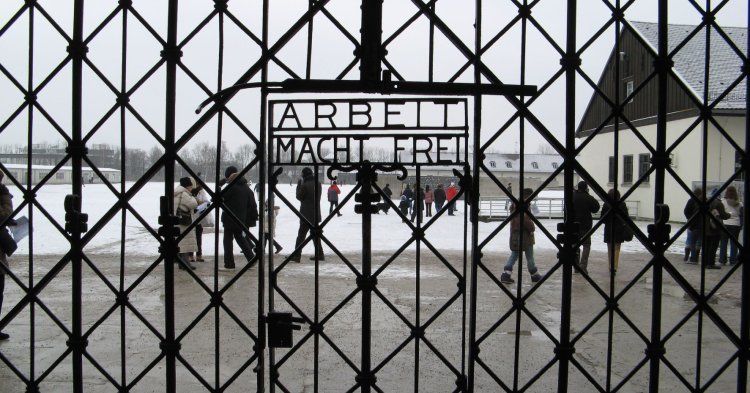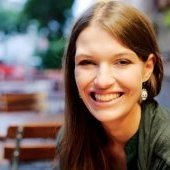We should be aware that the past becomes history quicker than we perceive it. And that we get to grow up in a Europe in which war, conflict and terror are more or less part of that history. When I was 16 I started doing political education in schools. I spent four years with Martin Löwenberg und Michael Finkenstaedt going into classrooms and moderated conversations about their memories of the Nazi period. Every lesson I asked the students a question to break the ice and invited them to stand up if they could answer “yes”. Meanwhile Michael has died and Martin lives in a retirement home. My generation was the last who was able to converse with survivors of the period directly. Today I talk with students about fleeing, displacement and migration politics” to inform and discuss it with them. I continue to start the lesson with a question: Do you know someone who experienced war? Even if you exclude your grandparents? Has a close relative died in a war?
Quite often are the present teachers taken by surprise by how many students will still get up. 50% of young people in Germany today have a migration background. And their family histories do not take place in peaceful Europe. People who have grown up in Germany tend to take peace on our continent for granted and overlook how fragile it actually is. “No more war, no more violence” was repeated by the honoured guests at the liberation celebrations of the concentration camp Dachau this past Sunday. This is our task, our duty, which the governor of Bavaria Seehofer even enshrined in the preamble of the Bavarian constitution. Angela Merkel said, that we need memories to never let something inhumane happen again and that Germans have a particular obligation towards Europe and the world. Youth organisations like us are among the last who get to put down a wreath on the Appellplatz in Dachau. “Never again” and “Against forgetting” is written on them.
Remembering means that we need to realise: even after World War II, war, terror and conflict are not far enough in the past to be part of history for the majority of Europeans, but are, nonetheless, abstract history, a history they have not experienced themselves, for many. The anniversary obliges us to commemorate not only the victims of the Nazi regime but to also Europe’s difficult path towards peace and unity.
It was briefly mentioned in the daily newspaper “Süddeutsche Zeitung” that a former IRA leader was shot in the streets of Belfast this week. 2015 also marks 20 years after the end of war in Croatia for my family, in which my uncle lost his life. The number of asylum seekers has passed the record from 2000, the end of the Kosovo war, in 2014. The fall of the Berlin wall was the in the year I was born, the events of Rostock-Lichtenhagen are older than my sister and Sixth formers this year. Europeans have truly earned the Nobel peace prize. It was a long, burdensome and cross generational path to get to where we are today. However, this achievement is tested more and more today, 70 after the war.
Europe and Germany experience the rise of radical right-wing populism, groups who appear increasingly confident and violent. Hatred against Islam, antiziganism, social Darwinism and other concepts of minority focused misanthropy come up again; anti-Semitism is only a stone’s throw away. Despite the Geneva refugee convention, which was signed in 1951 on the basis of the events of the Second World War, more and more people drown in the Mediterranean. “When I see how some citizens spread hatred against refugees (..) – I have to ask myself: How deeply is the highly treasured concept human dignity anchored in minds today?” asked President of the Central Council of Jews in Germany Josef Schuster during the commemorations in Dachau. ISIS is strengthened every day and is currently building an inhumane system of oppression and systematic genocide, potentially a system on par with the Nazi regime. The conflict in Ukraine creates uncertainty all over Europe, especially among the younger member states and brings back memories from the Cold War.
At the liberation celebrations the director of Bavarian commemorations monuments, Karl Freller, also brought to mind that Dachau was not a typical concentration camp. Among Jews, Sinti, Roma and the Polish, there were a large number of political enemies and resistance fighters: communists, priests and brave people who took a stand for what they believed in. Over 20.000 died in Dachau as a consequence. Alan Lukens, one of the GI responsible for the liberation of the camp, today 91 years old, said: “We need to remember that the Good can overcome evil.”
A couple of weeks ago, on the first sunny and warm day, I sat with my grandmother on her terrace with coffee and cake. My grandparents have never talked about the war much, just sometimes they would mention a few memories. On this particular day my grandma said: “This anniversary, 70 years, really affects me emotionally. My memories are returning today. Today 70 years ago, I was 10 years old at the time and at school. There was an air raid on the city of Kempten. I experienced it above ground. We kids were running home from school and a man took us into a house in a cellar. After a while a young man came by who was looking for us, regardless of the raid, because our mother did not know where we were. As soon as he found us, he ran back to let her know that we were safe. The scenery after the attack was terrible.
So many people who had died. And so many familiar faces.” She told me about how her mother transported her and her younger brother as a baby on a bike 130km to Munich and another 50 to a small village, Moosach bei Ebersberg. “I cried the whole cycle ride. What I saw that day.. I was only 10 years old.. it was horrific. So much was destroyed.” She wanted to tell me more stories and I would have loved to listen, but in fact we were interrupted in this exact moment by noise sounding like gun shots from the neighbour’s house. The neighbour’s sons had friends over and ran around in helmets, masks and toy guns. They entrenched themselves behind their sandbox and slide. “Are they playing with guns?” asked my grandmother. “Yes, grandma I think they are playing war.” “This is something I will never understand: how anyone could buy their child a (toy) gun.”
Peace is not a certificate one obtains at one point and can keep forever. Peace is and remains a long and burdening path. Europe is this path. 70 years ago, it was the challenge of the youth, our grandparents, to build a new Germany and a new Europe. They succeeded. The anniversary today commemorates that we are the new youth and have the duty to retain their work.


Follow the comments: |
|
